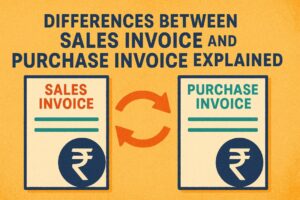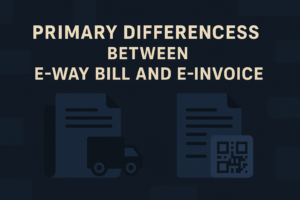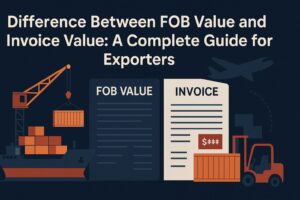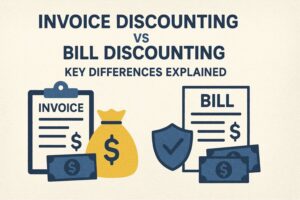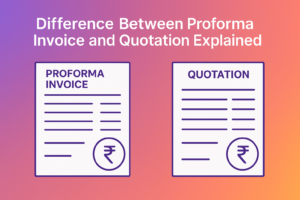Difference Between Invoice and Contract: Know Their Purposes
- 17 Nov 25
- 9 mins

Difference Between Invoice and Contract: Know Their Purposes
Key Takeaways
- The difference between invoice and contract lies in their purpose, invoices request payment, while contracts define obligations.
- Invoices are generated after delivering goods or services, whereas contracts are signed before work begins.
- An invoice is not legally binding but is essential for GST compliance and tax filing.
- A contract is a legally enforceable document under the Indian Contract Act, 1872, offering protection in disputes.
- Understanding the difference between invoice and contract ensures smoother business operations, compliance, and timely payments.
Did you know that over 80% of Indian businesses now receive invoices in digital format? Yet, despite this digital shift, many organisations still face challenges in document management, often due to confusion between essential financial documents. One of the most common mix-ups is between an invoice and a contract.
While both play critical roles in business transactions, misunderstanding their distinct purposes can lead to delayed payments, compliance issues, or strained vendor relationships.
This blog explores the key difference between an invoice and a contract to help you manage your financial processes more accurately and efficiently.
Invoice vs Contract: Key Differences
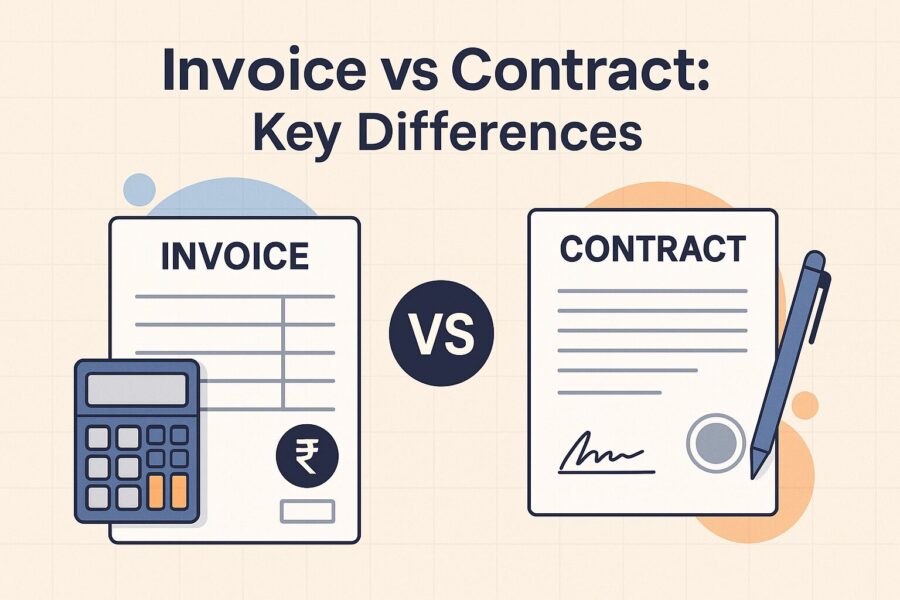
The major differences between an invoice and a contract include:
| Parameter | Invoice | Contract |
| Concept | These are documents issued to request payments. | Contracts legally bind two or more businesses or vendors. |
| Purpose | Invoices ensure timely settlements for delivered supplies. | Contracts justify what each involved party needs to do before starting work. |
| Legal Status | Invoices alone are not legally binding. But, these are needed for GST filing. | Businesses enter into contracts to fully commit to their work as these are enforceable under the Indian Contract Act, 1872. |
| Timing | Businesses generate invoices after delivering a service or good. | Contracts are signed before the beginning of a project. |
| Tax effects | An invoice should include the supplier’s GSTIN and needs to be as per the latest GST regulations. | Contracts are not directly subject to tax implications, but they do affect overall taxation. |
| Example | A software company bills ₹1 Lakh after delivering an app for its client. | A software company contractually partners with an app developer for ₹50,000 to complete a project for 2 months. |
What is an Invoice?
An invoice is a payment request document issued to a particular buyer after the completion of a transaction. Key elements of an invoice include:
- Contact Information of the Business: It is a mandatory part that ensures every customer can reach out to the business if needed.
- Client Information: This specifies a customer’s name, phone number, and email address (optional). It helps ensure that the right person collects the invoice.
- Invoice Date and Number: Another compulsory field, this part helps to track payments to facilitate future communications.
- Description of Supplies: This section encompasses the main area of an invoice and ensures customers receive 100% transparency by detailing each item along with its corresponding unit price.
- Payment Terms: In this area, a seller usually describes the mode of payment, discounts (if offered) and due date of payment if applicable.
Purpose of an Invoice
According to an IMARC Group report, the e-invoicing market size in India is anticipated to grow at a 21.3% CAGR through 2033. Digital-first companies recognised the importance of invoices and are now increasingly automating processes to boost efficiency and eliminate redundancy.
With a top-tier GST-compliant invoicing software, businesses can now fulfil the core functions of invoicing. These include:
- Record-Keeping: Invoices act as legal proof of the transaction. Thus, these documents are necessary for accounting and tax calculations.
- Intimation for Payment: Moreover, an invoice formally addresses the buyer to settle a bill amount.
- Direct Tax Compliance: Lastly, invoices are compulsory for maintaining compliance and filing monthly/ quarterly GST returns.
💡For your bill payments and tracking business transactions, use the PICE App.
What is a Contract?

Contracts are legally binding documents acknowledged by multiple parties. If signed, this agreement guarantees that each signatory will fulfil certain obligations and may exercise particular rights.
Unlike an invoice, a contract is an elaborate document with the following elements:
- Offer and Acceptance: This forms the foundation of a contract. It ensures that all involved parties clearly agree on the same terms, creating mutual understanding and intent to proceed.
- Intention to be Combined Legally: It indicates that the parties are serious and are entering into the contract to create enforceable obligations.
- Awareness: To avoid miscommunication, this part covers each party’s rights, responsibilities, and the agreement's terms clearly.
- Consideration: A contract's consideration is the mutually exchanged value, be it money, goods, services, or a commitment.
- Capacity: This ensures that all parties involved are legally capable of entering into a contract. Individuals must be of sound mind, not under the influence of substances, and of legal age.
- Legality: Finally, this is a critical component that summarises the contract’s purpose and establishes its applicability in terms of law.
Purpose of a Contract
During the last calendar year, over 86 million income tax returns were filed across India. The widespread filing of income tax returns reflects increasing formal compliance and transparency. That is why well-organised business contracts are essential. They ensure:
Defined Obligations: Contracts state what a member of the agreement is supposed to execute.
Legal Protection: These documents are essential in safeguarding companies from breaches as they enforce legal terms.
Solid Business Relationships: Legal contracts establish trust among the involved parties and instil professionalism.
Now that you have a concise overview of both legal documents, let us explore the difference between an invoice and a contract.
Legal Aspects of Invoices and Contracts
According to the Goods and Services Tax laws, all invoices will have to have the taxpayer’s GSTIN, the correct HSN or SAC codes and a tax breakup. While crucial for tax purposes and payment disputes, these invoices are not legally binding contracts. Inaccurate billing may lead to fines imposed by the tax collectors.
In formulating contracts, care should be taken to ensure that they meet the requirements of the Indian Contract Act. This legal framework outlines the following essential requirements:
- There must be offer and acceptance clauses.
- A segment should be dedicated to case-specific considerations.
- Finally, there should be a legal purpose.
The contracts can be enforced in a court of law to protect your interests in case of disputes. A contract will provide a remedy or claim damages upon specific performance by the court.
The combination of invoices and contracts results in a legal record that secures your company against audits and helps to sterilise business operations against breach of taxation regulations in India.
When to Use an Invoice vs a Contract?
A business owner will use invoices after the committed service or good has been provided. It clearly defines that invoices help a supplier get paid for the value they have already provided.
Unlike the issuance of an invoice, contracts become more appropriate before a person/ business begins making bigger commitments. For instance, a firm will need to enter a contract if it intends to begin a construction project. Similarly, business partnerships and long-term consulting work require contract generation as these involve large transactions.
Best Practices for Using Invoices and Contracts
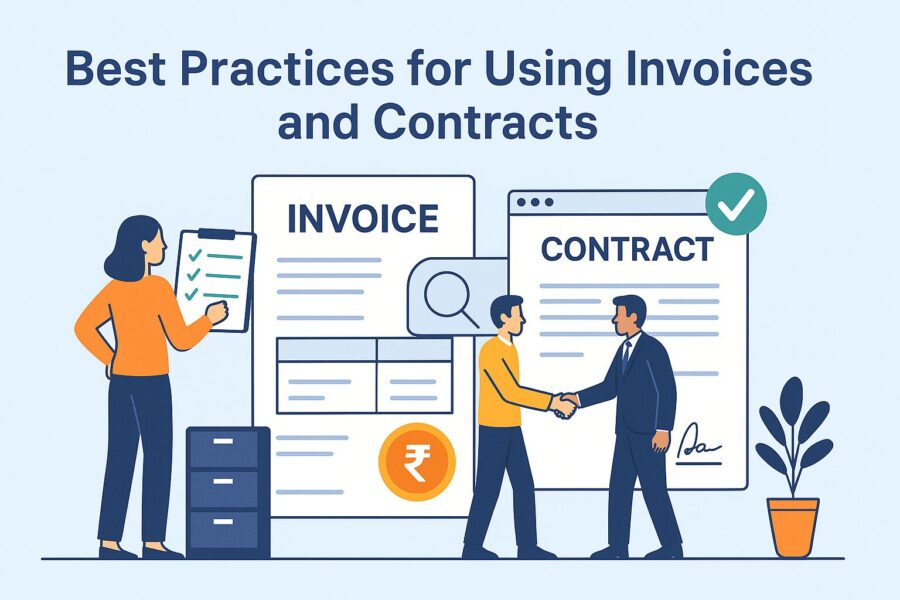
If you run a business, merely knowing the difference between an invoice and a contract will not be sufficient. In addition, you should familiarise yourself with some best practices to avoid data misinterpretations and omissions.
1. Focus on Accuracy and Completeness
It is crucial to present complete details across your documents. This means all your bills should have GST details. Similarly, the contracts must clearly state the list of deliverables and accepted payment terms.
2. Organise Your Documentation
Next, the priority should be to keep the business records organised. You can deploy professional GST-compliant software to store all invoices and contracts in easily discoverable folders. It will be handy, especially at the time of tax filing or when any payment dispute arises.
3. Utilise Digital Tools
Cutting-edge invoicing automation tools like Pice for Business can allow you to generate, sign and save contracts securely. By using these solutions, you save time, reduce mistakes and can easily meet Indian legal guidelines.
Common Mistakes to Avoid While Issuing an Invoice or a Contract
A study published by Gartner indicates that nearly 18% of accountants worldwide admit to being prone to making errors on a daily basis. Although adopting automation tools helps to address this issue to a large extent, you should still be cautious when using this software to avoid common errors.
You must:
- Use Financial Tracking Systems
You can integrate procedures to analyse invoices and stay ahead of payment deadlines. Through an appropriate app, you can set reminders for pending payments, which will help maintain a steady cash flow.
- Ensure Legal Compliance
While signing contracts, it is required to validate their enforceability. Accurate tax calculations and fully completed invoices prevent audits and fines.
Conclusion
To facilitate business operations and ensure its financial security, it is crucial to understand the difference between an invoice and a contract. Whereas an invoice is a unilateral document presented to make a request for payment after delivery of goods or services, a contract is an agreement reached by both parties.
Contracts are legally binding on both parties that are put in place prior to work being undertaken and stipulate obligations and rights of each of the parties. Being aware of this difference can help avoid disagreements on payments and guarantee the legality and taxation.
 By
By 






